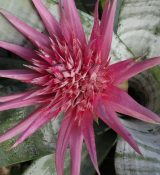Interiorscape Basics – Part One
Author: admin2 Comments
Care and Culture, Classification, Growing Indoors
Just as is true in outdoor gardens, every interiorscape is unique. However, a few simple guidelines are useful for creating orderly interiorscapes in which the plants appear to belong exactly where they have been placed.
Entryway Accents
One of the most potent places for a plant is just inside the door or at the closest location to the entry where light is available. Entryway plants are natural greeters, and they help ease the transition between the outdoor and indoor worlds. Select though plants for this job over species that are easily injured when they are touched.
Companionable Groupings
Collections of differing types of houseplants often look best when they are arranged in groups of three of five plants, with the tallest plant placed behind or to the side of the smaller ones. This is an excellent way to capitalize on differences in plant color and texture among various houseplants.
Little Landscapes
In spaces where a single plant tends to get lost, try multiples instead. For example, you might locate two or three matching pots of the same plant together in the same place, which makes a strong textural statement. Or conjure up the feel of a forest by filling an indoor window-box with different plants of similar size (they can be kept in individual containers slipped inside the planter). Dish gardens, in which several small plants are grown together in a low, broad container, can be moved from the windowsill to the dining table when you need a fast centerpiece.
For more information on Interiorscape Basics, check out Part Two and Part Three!
Source
Pleasant, Barbara. The Complete Houseplant Survival Manual: Essential Know-How for Keeping (Not Killing) More Than 160 Indoor Plants: Storey Publishing LLC, 2005. Print.
2 Responses to “Interiorscape Basics – Part One”
Leave a Reply

Resource Download
Hechtia Care Cheat Sheet
Learn how to care for your Hechtia bromeliad with this quick and easy informational guide.
Learn More
Ask an Expert
Questions about bromeliads?
Our experts love a challenge!
Photo of the Week
Submit your photo to be featured on the blog!
More Photo of the Week Winners
Submit Photo








I bought a bromeliad about a month or so ago and the tips of the leaves are starting to turn brown and then a little yellow. I water it once a week, no direct sun light. What do you suggest? These are the coolest looking plants……
Hi Whitney, do you know what variety of bromeliad you have?